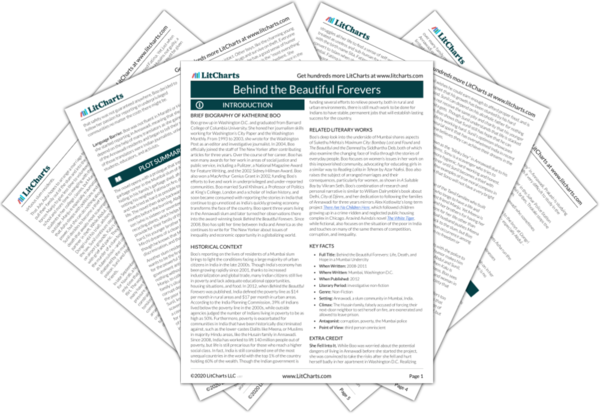Society, Competition, and Social Division
As India advances into the twenty-first century, its government hopes to show a narrative of constant progress towards a fairer society for all Indian citizens. Yet the old caste system, in which a person was born into a specific group that defined their social status, continues to shape who has power in Indian society and who remains poor and outcast. Given that the poor make up the large majority of India’s population, Katherine Boo investigates…
read analysis of Society, Competition, and Social DivisionOpportunity, Corruption, and Inequality
While capitalism and globalization initially gave Indians across all social classes hope that more opportunities would be available to them, these opportunities have not proved as transformative to the lives of the poor as they have to the lives of more privileged segments of society. Old inequalities, in other words, have still dominated 21st century Indian life. From what Behind the Beautiful Forevers shows of life in Mumbai, opportunities for social mobility reward a select…
read analysis of Opportunity, Corruption, and InequalityThe Local vs. The Global
Behind the Beautiful Forevers is an attempt to go beyond the popular narrative of India as a rising global power experiencing an economic boom that is uplifting all of its citizens. The source of the book’s title is a concrete wall plastered with ads for ceramic tiles that will stay “beautiful forever”—this wall is intended to hide Annawadi from the sight of wealthy international travelers at the Mumbai airport. In other words, the wall tries…
read analysis of The Local vs. The Global
Permanence, Legacy, and Erasure
In a slum made of temporary materials, everyone living in Annawadi strives to make themselves important enough not to be erased. In a way, by recording their lives in this book, Katherine Boo helps to make these lives visible and inerasable to those who might ignore them, such as the Indian government and the entire developed world, both of which tend to prefer not to look directly at poverty.
Boo spent three years living in…
read analysis of Permanence, Legacy, and ErasureLife and Death
While some people outside of India erroneously assume that the Hindu belief in reincarnation means that Indians do not value life as much as other people (since Hindus trust that they will be born into another life after this one), Boo takes pains to counter this belief and show that life is incredibly precious to the residents of the Annawadi slum. This is apparent in the Annawadians’ struggles to live, despite that fact that those…
read analysis of Life and Death






